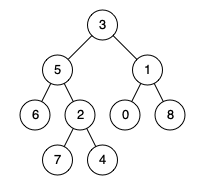[LeetCode] 236. Lowest Common Ancestor of a Binary Tree
 조현준
조현준
Link : 236. Lowest Common Ancestor of a Binary Tree
문제 설명
Given a binary tree, find the lowest common ancestor (LCA) of two given nodes in the tree.
According to the definition of LCA on Wikipedia: “The lowest common ancestor is defined between two nodes
pandqas the lowest node inTthat has bothpandqas descendants (where we allow a node to be a descendant of itself).”Example 1:
Input: root = [3,5,1,6,2,0,8,null,null,7,4], p = 5, q = 1 Output: 3 Explanation: The LCA of nodes 5 and 1 is 3.Example 2:
Input: root = [3,5,1,6,2,0,8,null,null,7,4], p = 5, q = 4 Output: 5 Explanation: The LCA of nodes 5 and 4 is 5, since a node can be a descendant of itself according to the LCA definition.Example 3:
Input: root = [1,2], p = 1, q = 2 Output: 1Constraints:
The number of nodes in the tree is in the range
[2, 10<sup>5</sup>].
-10<sup>9</sup> <= Node.val <= 10<sup>9</sup>All
Node.valare unique.
p != q
pandqwill exist in the tree.
문제 분석
글의 내용이 많기는 하지만 말하고자 하는 요점은 아래와 같습니다.
“2개의 노드가 만날 수 있는 가장 가까운 상위노드는 어디인가?”

위 그림과 같이 2개의 노드를 타고서 위로 올라갈때 만날 수 있는 가장 가까운 노드를 찾으면 되는 것이죠
해결 방안
그래서 저는 다음과 같이 문제를 해결하려고 했습니다.
p, q node에 대해서 root 에서 부터 path 배열을 각각 구한다
2개의 path 정보 중에서 곂치는 노드 중 가장 낮은 위치에 있는 노드를 찾는다
path 배열을 구하기 위해서 재귀를 이용해서 문제를 풀었습니다.
해답 코드
class Solution {
fun lowestCommonAncestor(root: TreeNode?, p: TreeNode?, q: TreeNode?): TreeNode? {
val pathToP = ArrayList<TreeNode>()
val pathToQ = ArrayList<TreeNode>()
findPath(root, p, pathToP)
findPath(root, q, pathToQ)
var lca: TreeNode? = null
var i = 0
while (i < pathToP.size && i < pathToQ.size && pathToP[i] === pathToQ[i]) {
lca = pathToP[i]
i++
}
return lca
}
private fun findPath(root: TreeNode?, target: TreeNode?, path: ArrayList<TreeNode>): Boolean {
if (root == null) return false
path.add(root)
if (root === target) return true
if (findPath(root.left, target, path) || findPath(root.right, target, path)) {
return true
}
path.removeAt(path.size - 1)
return false
}
}
class TreeNode(var `val`: Int = 0) {
var left: TreeNode? = null
var right: TreeNode? = null
}
느낀점
그래프 문제여서 처음부터 막상 겁을 먹었던 것 같습니다. 하지만 문제를 풀때에 큰 틀에서 우선 접근하고 그다음에 구현에 대해서 신경쓰니깐 그다지 어렵지 않았던 것 같습니다. 특히 AI를 사용해서도 문제를 풀어보고 있는데 정답을 바로 달라고 하는 것이 아니라 먼저 큰 틀을 생각해서 가장 이상적인 순서도를 제시하고 문제를 푸니 문제 해결 속도와 디버깅이 빨라서 생산성이 높아진것도 느낄 수 있었습니다.
Subscribe to my newsletter
Read articles from 조현준 directly inside your inbox. Subscribe to the newsletter, and don't miss out.
Written by

